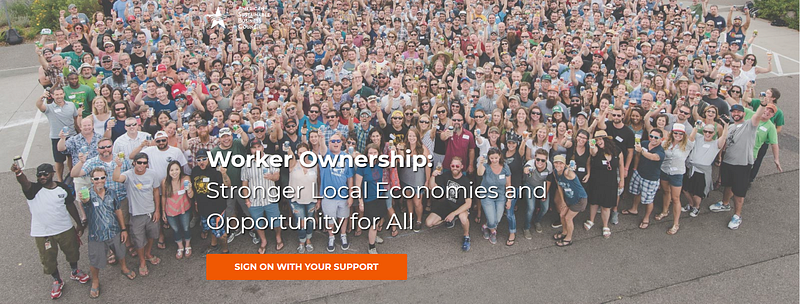ASBC sees employee ownership as key to building a sustainable economy
by Sarah Stranahan

The American Sustainable Business Council (ASBC) is a network of businesses and business associations that have committed themselves to the triple bottom line of people, planet, and profit. In recent years, advancing employee ownership has been a key component of ASBC’s agenda: to promote sustainable business models as good business and the foundation of a sustainable economy. Established in 2009, the organization represents more than 250,000 businesses and provides a powerful counter-narrative to the U.S. Chamber of Commerce — potentially a powerful new force to advance employee ownership.
For ASBC, employee ownership fits naturally alongside a set of best practices for employers that the organization calls “The High Road Workplace.”Employee-owned companies pay better wages and offer higher quality jobs than traditional companies; they also tend to value sustainability. Curious about ASBC’s perspective on these issues, Fifty by Fifty recently spoke with John Minor, the ASBC policy manager whose portfolio includes employee ownership and high-road practices.

Minor, who began work at ASBC in 2018, brings to his work a law degree from Fordham University and experience as a Congressional liaison at the Consumer Financial Protection Bureau. He also served as a legislative aide for North Carolina Senator Kay Hagan. When asked why he chose to work at ASBC as an advocate for employee ownership, Minor told us about a law school experience that changed the direction of his career.
“I am passionate about advocating for policies that improve the lives of workers,” says John Minor, policy manager for ASBC.
“When I was at Fordham I interned at the Community Economic Development Clinic where I was exposed to the workplace issues and the benefits of employee ownership. Working with ROC [Restaurant Opportunities Centers United, an worker advocacy organization to the restaurant industry, which also started the worker-owned restaurant Colors], I saw the impact that employment policies have on the welfare of millions of low-wage workers. As a result, I am passionate about advocating for policies that improve the lives of workers.”
In 2014, in partnership with 1Worker 1Vote — an initiative to grow unionized worker-owned cooperatives based on the Mondragon model, the largest industrial scale cooperative network — ASBC launched the “Ownership4ALL” campaign. The goal was leveling the playing field for all types of employee ownership structures (tax laws treat cooperatives differently than ESOPs, and S Corp ESOPs and C Corp ESOPs differently from each other).
The Ownership4All campaign provided the foundation for ASBC’s lobbying effort in support of the Main Street Employee Ownership Act (MSEOA), which found its way into law in August 2018 via the defense appropriations bill. MSEOA, which enjoyed bipartisan support, was the first employee ownership law to pass Congress since the 1990s.
In partnership with 1Worker1Vote — an initiative to grow unionized worker-owned cooperatives based on the Mondragon model — ASBC launched the Ownership4All campaign.
In lobbying for MSEOA, ASBC engaged employee-owned member companies such as New Belgium Brewing Company, Eileen Fisher, NRS, and South Mountain Company as advocates. These companies provided an effective business voice in support of MSEOA. Ashley Peel from NRS, an outdoor supply company located in Moscow, Idaho, for example, testified:
“As a 100 percent employee-owned company, we see the value of investing in our employees and the positive impact it has on our community. Our business model works because more and more consumers are choosing to do business with companies that share their values.”
The “Business Case for Employee Ownership” serves as a reference guide and set of talking points for members to advance worker ownership.
To support the campaign, ASBC also published The Business Case for Employee Ownership, which serves as a reference guide and set of talking points for members to continue to advance worker ownership. The publication cites research from National Center for Employee Ownership and others showing that ESOP companies have 25 percent greater job growth than comparable companies without ESOPs, and also pay their workers 5 to 12 percent higher wages. Employee-owned companies are more resilient: during the Great Recession, employee-owned businesses laid off fewer employees and had higher business survival rates.
The Business Case for Employee Ownership identifies four barriers to expanding employee ownership:
- ·Access to technical help and training: In transitioning to employee ownership, businesses need help assessing viability and setting up appropriate legal structures.
- Access to capital: Many traditional banks are reluctant to lend to worker cooperatives. Employee Stock Ownership Plans (ESOPs) have better access to capital yet are not widely integrated into financing models like private equity; ESOP conversions also generally require partial seller financing, which can limit seller willingness to sell to employees.
- Parity for ownership models under federal laws: Tax laws that treat different forms of employee ownership differently cause confusion and fragmentation among employee-owned firms and advocates.
- Federal agency coordination: The multiple federal agencies that interact with employee-owned businesses are poorly aligned, undermining their ability to provide consistent advice and support.
To overcome these barriers, the ASBC policy agenda has three priorities:
- Change tax laws to provide parity in support for all types of worker-owned companies.
- Help worker-owned companies obtain necessary funds to start and grow.
- Expand federal technical support to businesses in transitioning to any model of worker ownership.
The Main Street Employee Ownership Act addresses some of these issues, but ASBC is hoping for further action on employee ownership. The organization is supporting the Promotion and Expansion of Private Employee Ownership Act, a senate bill that would give S Corporation ESOP owners the same right to defer capital gains taxes as C Corporation ESOP owners. ASBC also supports the WORK Act, which would authorize the Department of Labor to provide training, grants, and technical support to state programs supporting employee ownership.
When we asked Minor what he found most rewarding about his work with ASBC, he referred back to his former mentors at the Community Economic Development Clinic and the recently passed NY State Senate Bill S5349A, which established a twelve-person advisory panel within the small business division of the state government to consider how to support and grow employee-owned enterprises across the state.
“It feels great to be playing on the same team as the organizations that inspired me to use my law degree for the public good in the first place,” said Minor. “I feel like I am paying it forward.”
Sarah Stranahan is Senior Editorial Associate at The Democracy Collaborative, and a leading member of its Fifty by Fifty employee ownership team.
Fifty by Fifty is working to transform the U.S. economy by growing employee ownership. Join our campaign, and we’ll send our monthly newsletter, filled with great company stories, right to your in box.
